HS2 is a proposed new railway line linking London Euston to Birmingham and in the second phase – Manchester, Leeds, Sheffield and eventually Scotland.
Supporters of high-speed rail argue it is necessary to meet the UK’s rapidly growing demand for travel. High-speed rail will provide the greenest, safest and most efficient form of transport. The investment will provide a major boost to business and the economy; the faster rail links will help reduce the north-south divide and overcome the externalities of car use.
Opponents of high-speed rail argue that it is primarily an unnecessary project that can’t be justified given the huge cost involved (£88bn in 2020 – much higher than initial estimate of £57bn) critics argue that there are much more pressing priorities such as small-scale road and rail projects which help to deal with smaller bottlenecks. Also, opponents are often motivated by the impact of the new railway on the environment.
Pros of High-Speed Rail
- The road system is becoming crowded with limited ability to keep increasing capacity. Offering high-speed rail will encourage more people to travel by train relieving gridlock in city centres. Therefore, it is not just rail travellers who will benefit, but those who gain from lower congestion on the roads.
- HS2 will free up capacity on the existing lines, enabling more local commuter services and more freight services – more freight trains will help take lorries off the road and provide environmental benefits.
- If extra capacity is not met by HS2 it could lead to large ticket prices on existing services to prevent overcrowding on peak services.
- Investment will provide jobs for those involved in building and running the new HS2
- Journey times from London to Birmingham will be less than one hour. There will also be quick rail links to Manchester and Leeds.
- Despite objections, HS1 has proved successful. Demand for HS1 rail travel to the Continent has proved to meet expectations; this has enabled more people to easily travel to Europe. A new service has created additional demand – not just taking from previous forms of transport
- The cost of HS2 will be spread out over 15-20 years. Therefore we can afford it.
- The £2-£3bn annual capital investment will help create jobs, stimulate economic activity and give a decent rate of return.
- As of January 2020, the project has already spent £9 billion on preparation (link). To cancel the project now, would mean this investment is lost. Industry figures claim scrapping project would cost as much as £12bn. (link)
- High-speed rail will take travel away from short distance air-travel, leaving a lower carbon footprint.
- The environmental impact will be mitigated by ‘green tunnels’ and planting of trees.
- Empirical results show that increased train frequency can have significant external benefits in terms of lower pollution, fewer road accidents and drops in infant mortality.
Figure 1. The environmental benefits of railroads: Effect of 10% increase in rail frequency
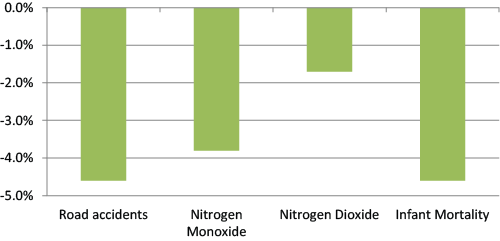 Source: VOX – Can railways curb traffic externalities?
Source: VOX – Can railways curb traffic externalities? - Trains have a better safety record than the roads. Passenger death rates (2008)
- By car 1.9 per billion Km
- By train 0.3 per billion Km
Cons of HS2
- There are other alternatives such as increasing train length on existing routes.
- HS2 may only benefit a small section of the population who use trains between major cities.
- Benefits of improved speed are debatable given that many people can now work on laptops away from the office.
- Environmental costs of building a new line through the Chilterns and Midlands. Residents are unhappy at impact on living standards and home values.
- In an era of austerity, spending on train service is not the highest priority. There is a high opportunity cost of spending on HS2 as the £88bn could be spent elsewhere (e.g. fixing potholes, reducing congestion on roads, decarbonising economy)
- Forecasts for passenger numbers are uncertain, there is no guarantee the demand will be there. In recent years, rail traffic growth has dipped. The scheme may not be finished until 2040.
- Rather than reduce the north-south divide, it may encourage people to live further away from London and use HS2 as a fast commute to London.
- The costs of HS2 continue to rise. Initially, in 2015, the project was forecast to cost £56bn but could now the total cost could soar to over £100bn. The higher cost is partly due to more expensive tunnelling to keep down noise to residents near the track. One report claims HS2 costs are out of control (BBC)
- There are cheaper and more effective ways to increase capacity, such as digital signalling, investment in local commuting routes. HS3 would link Manchester with Leeds and could be a better way to reinvigorate the northern economy.
- Rail-future a campaigning group for rail travel criticised the need for ultra high speed trains, there may be a bigger overall benefit from running slightly slower trains over different routes. Railfuture
- Although £8bn has been spent on preparation – this is a sunk cost – we shouldn’t go ahead with a bad scheme just because of sunk costs – which are spent no matter what choice we make. It is better to write off bad spending – than compound it and make it worse. (see sunk cost fallacy)
Falling cost-benefit ratio
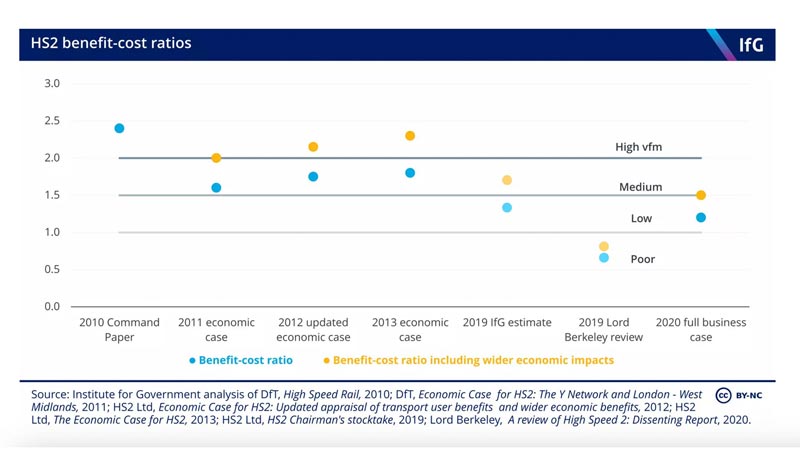
Rising costs of HS2
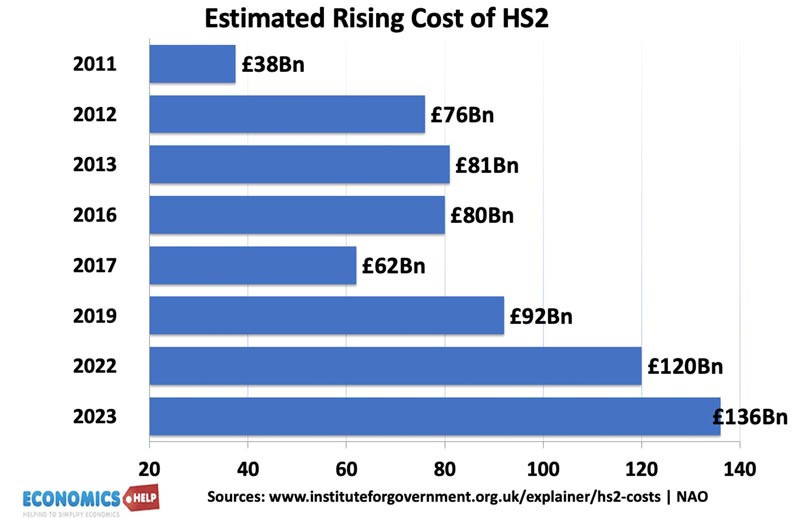
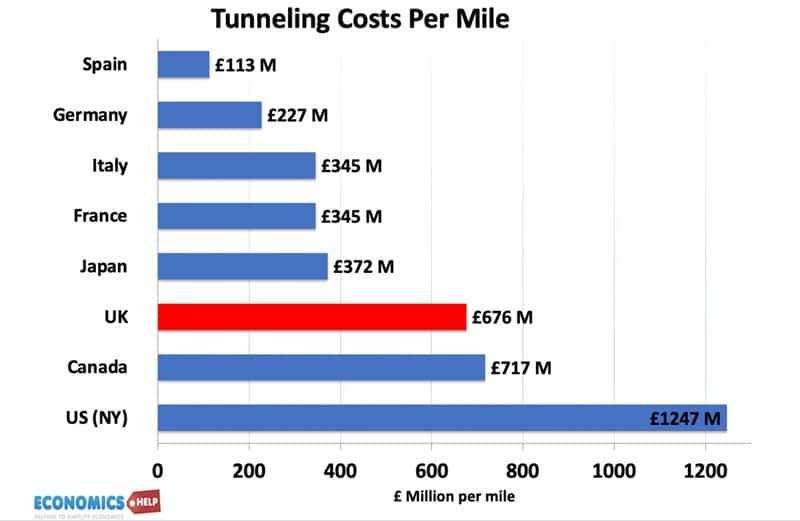
Overall
It is not often Britain attempts an ambitious investment project. The political system makes expensive, forward thinking investment projects unlikely to return much political capital. Elections aren’t won by promising improved transport links for the next decade. True, we like to grumble at the inadequate state of current transport links, but to actually invest the necessary money and time is another matter.
HS2 will cost approx £88 billion to build over 10 – 15 years, but its supporters claim it will generate a return on rail fares, economic growth, and knock-on benefits to consumers and local economies. There is an economic case for HS2 but there are also good economic cases for other infrastructure investment, which is less eye-catching but capable of delivering benefits in a different way.
Related

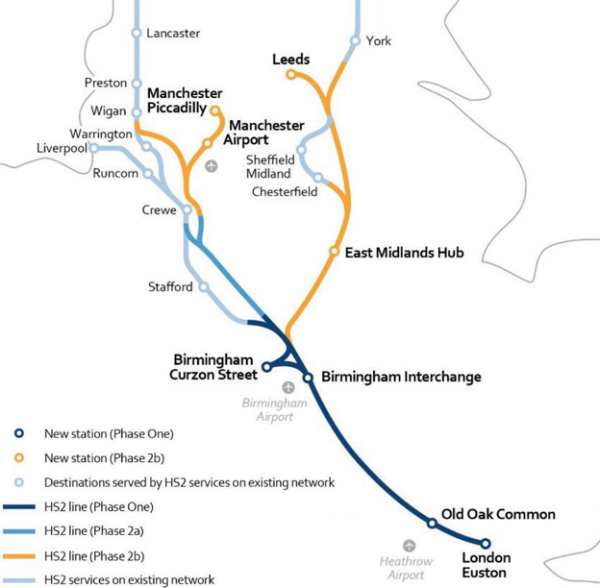
I personally think that the high speed rail 2 will be a success due to the factors you have mentioned however, I have learned that one of the aims that they are trying to achieve by this is dispersing the current air travel customers from heathrow and send them to Birmingham and if they succedd then congrats but if not then they migh even have all of Birminghams air travel customers in Heathrow. could be added to Cons of HS2 🙂
Yeh, Calvin. Also, why should we spend our money on it? Aren’t there other problems that need to be prioritised?
That is also what I thought, we should prioritised what needs to be prioritised, then when we feel like everything is done then maybe we can carry out the HS2 scheme
Instead of HS2, which to me comes across as a reactionary gimmick designed to make it look like we’re keeping tabs with France, China, Japan and Germany, why not improve current infrastructure as mentioned in the article?
Perhaps introduce new rolling stock on WCML with more and longer carriages, reduce number of operators on high speed section of track on WCML, which means increased frequency of trains, maybe increase operating speed to something like 170mph (just a random figure). These changes, whilst they’re not without their caveats can be made in shorter time and at a lower overall cost. Consider that by the time HS2 actually gets completed, the need for capacity will have increased again. In fact, Will HS2 even be ready by 2033?
The WCML rolling stock is fairly modern, Class 390 trains only around 15 years old. We have been trying to continually modernise the rolling stock and adapt trains for the Victorian infrastructure. For example, look at the experimental tilting train we had back in the 70s/80s. The current WCML rolling stock is also adapted to travel fast on that route. I don’t know if they can safely achieve higher speeds with the old infrastructure. I think in the long run new infrastructure would pay off more where the tracks are built for higher speeds.
Also to the arguement about just having longer trains, aren’t the trains already lengthened to their limit?
HS2 should be scrapped unless it goes up the WCML
The hs2 is a waste of money
HS2 is a classic example of “old” economic thinking. When we are facing species extinctions and a new awareness of the immense value of Nature to our very survival, some of us plan to tear a trench though valuable bio-diverse environments, when substantial investment in the existing rail infrasructure could address existing capacity problems. HS2 is the last gasp of dinosaur, pre-environmental awareness economics. Ditch it.
Threading new lines over, under and between existing track is virtually impossible, would take longer, cause years of disruption, cost more, require overhead power and different signalling systems to be interwoven among the existing.
The curvatures on existing routes would require severe speed reductions in several places. The whole idea is to take traffic away from the WCML leaving more capacity for both intermediate commuter trains and freight paths while reducing travel times.
Assuming fares cover operating costs, and with an average saving of 30 minutes per passenger per train journey (usually return journeys so that’s 1hr/passenger) with a 1000 passengers per train, 15 per hour, 18 hours, 360 days a year that is a saving of 87million man hours a year worth c£1.7bn. That’s a payback of c50yrs.
You can argue that some will be working on the train but it is less productive than on site plus there are other benefits of increased business (more employment, more taxes paid, more consumer expenditure), fewer road deaths, fewer air trips, lower carbon, more tourism spend etc etc. making the payback even shorter. Even this back-of-a-fag-packet (vape box?) calc makes it worthwhile doing.
Not sure I’d support it as it stands but if it must go ahead why not double its capacity straight away far cheaper to do on the initial build and by the time it’s built it will be needing an upgrade to get even more cars off the roads.
One aspect overlooked is the spike in carbon emissions which will come from HS2s construction. Steel, track ballast and cement/concrete are very energy intensive materials to manufacture and the build of HS2 will consume millions (billions?) of tons of the stuff. Even if the project meets passenger forecasts it will be a very long time before this initial release of carbon is offset (by people switching from -electric?- cars). And by then is it too late; the next decade is said to be crucial for getting a handle on global warming?
I would like to know how HS2 will improve in any way the movement of freight, when there is no quicker and effective way as road transport. Surely it would be a better way forward to invest in low carbon road transport and proper investment in the road systems that we already have. Moving a few people North and South doesn’t explain how it will make such a massive difference to the uk economy.
In the UK, Rail freight is currently operating close to full capacity. Firms would like to use more rail freight but the network is taken up with passenger trains. HS2 would enable more passenger services on new lines, freeing up space for freight on existing lines.
Scrap the lot, invest it in the hyper loop system being looked at by Elon Musk, now that is a forward thinking system of transport.
Whilst BJ has now given his support to HS2 and the confirmation 10s of billions of pounds will be spent on it and it will obviously overrun like all Government projects (Crossrail), here in East Yorkshire we are still having to travel on Pacer trains (buses on tracks)
Thanks BJ.
Why hasn’t a cost/benefit analysis been done and published and released publicly? HS2 is going to be very important if successful with Brexit and will help spread the wider economy away from London. But only if we can do it? I heard a Chinese firm have put two feet forward on the project and said they can get it done faster recently too?!
Yet anyway i have also heard we already have a high speed rail link with London from Birmingham? To me the proof is in the pudding i guess….
Why hasn’t a cost/benefit analysis been done and published and released publicly? HS2 is going to be very important if successful with Brexit and will help spread the wider economy away from London. But only if we can do it? I heard a Chinese firm have put two feet forward on the project and said they can get it done faster recently too?! Within the interests i believe of Chinese investment into the city.
Yet anyway i have also heard we already have a high speed rail link with London from Birmingham? To me the proof is in the pudding i guess….
Loss of wildlife, a huge money pit (especially now when a large part of the market has dried up for a while), it won’t be carbon neutral until the next century, loss or displacement of endangered species, can’t meet its promise of no net loss of biodiversity – loads of trees already planted have died, need to get the bloody trains we’ve already got working properly first (see climate change note earlier), loads of people evicted form home, some not properly recompensed.
Who decided we need to travel so fast over such a short distance, London to Brum? HS lines elsewhere were brought in to travel much longer distances. In a time of climate and environmental crisis we are going ahead with a train that will use more energy per mile because it is going so fast and has destroyed vast swathes of environment in its construction. I guess it wont be stopping anywhere between Brum and London because it would be so fast so what if I want to get off inbetween? So what sort of passenger will need to travel quickly between Brum and London, surely not a commuter as who would live in one city and commute to another, dont people live somewhere nice and commute to work? The current Covid pandemic has taught us that many do not need to travel to do their job we should be investing in more fast broadband communications not these mammoth never ending dinosaur projects. As for trains getting people out of their cars and onto rail, why are the government planning to spend 21 billion on new roads in the coming future? I rather suspect the real reasons for HS2 are more to do with lining the pockets of various companies who prop up the Tory party. They are all corrupt anyway.